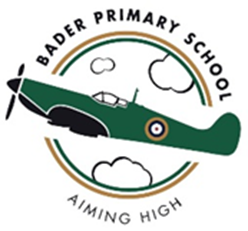Science
Intent
‘Primary Science isn’t just about nurturing the scientist of the future. It’s about ensuring ensuring every child develops a natural curiosity about the world around them and starts to think analytically about situations.’
Professor Robert Winston
At Bader Primary School, we aim to provide an understanding of biological, physical and chemical processes and how our world is influenced by scientific knowledge. We aspire to offer an inclusive curriculum that allows children to build upon prior knowledge and develop their working scientifically skills so that they can apply their knowledge of science when using equipment, conducting experiments, building arguments and explaining concepts confidently, continuing to ask questions and igniting curiosity about the real world and our local community. Through our ambitious and progressive curriculum we aim to promote critical thinking and enquiry skills, develop children’s conceptual understanding and encourage respect for an ever changing scientific world. We ensure that all children are exposed to high quality teaching and learning experiences, which allow children to explore their outdoor environment and locality and ensure they are immersed in scientific vocabulary, which aids children’s knowledge and understanding not only of the topic they are studying, but of the world around them. Our purposeful and engaging curriculum builds on science capital for all our children, regardless of their background and starting point so that they are inspired to continue to use science in their everyday life, future education and careers.
Implementation
In the EYFS teachers understand that Science begins with children’s very first acts of exploration. They ensure that they provide a stimulating and engaging environment (both indoors and outdoors) and provide children with access to high quality learning experiences which are both adult and child-led. Teachers encourage children’s scientific inquiry and develop children’s understanding of the world. The teachers in the EYFS facilitate children’s curiosity through asking them open-ended questions. Science is taught, in topics, discretely throughout Key stage 1 and 2. We ensure that we follow the National Curriculum statutory requirements. Teachers are familiar with previous and subsequent year groups’ content which enables them to link to prior learning and build on previous knowledge. They are also aware of where a unit of work fits in across the curriculum – we believe this is essential in ensuring key knowledge is taught and assessed to maintain progression through the curriculum.
In KS1, each topic is linked with the National Curriculum statutory requirements and teachers are aware of the children’s previous knowledge. Topics will begin with a ‘hook’ activity to get the children engaged and think about those ‘Big Questions’ that they would want to investigate. Children develop an understanding of Science within the wider world through exploring and investigating within the local community. They are taught to use the following practical scientific methods, processes and skills: asking simple questions and recognising that they can be answered in different ways; observing closely, using simple equipment; performing simple tests; identifying and classifying; using their observations and ideas to suggest answers to questions and gathering and recording data to help in answering questions.
In LKS2, each topic is linked with the National Curriculum statutory requirements and teachers are aware of the children’s previous knowledge. Topics will begin with a ‘hook’ activity to get the children engaged and think about those ‘Big Questions’ that they would want to investigate. During ‘exploration time’, children will be able to build on prior knowledge and link ideas together, enabling them to question and become enquiry based learners. Teachers find opportunities to develop children’s understanding of their surroundings by accessing outdoor learning.
In UKS2, each topic is linked with the National Curriculum statutory requirements and teachers are aware of the children’s previous knowledge. Topics will begin with a ‘hook’ activity to get the children engaged and think about those ‘Big Questions’ that they would want to investigate. During ‘exploration time’, children will be able to build on prior knowledge and link ideas together, enabling them to question and become enquiry based learners. Children will then be able to create their own investigations based upon this ‘exploration time’ and begin to apply their working scientifically skills. Teachers find opportunities to develop children’s understanding of their surroundings by accessing outdoor learning. We have plenty of links to outside agencies to promote STEM learning including Children Challenging Industry, Ground Works and SCOUTED to name but a few. Science week occurs annually and children are engaged in workshops and investigations to further develop their working scientifically skills. We also value the importance of keeping parents connected to children’s learning in science and therefore offer parents science workshops to attend with their children. We also offer after school clubs to promote and develop STEM learning.
Impact
Science at Bader Primary School prepares children for an ever changing scientific world. Children will explore their outdoor environment and locality through first hand experiences. Through various workshops, trips and interactions with experts and local industries, children develop an understanding that science has changed our lives and that it is vital to the world’s future prosperity. We teach a purposeful and engaging curriculum that allows children to develop their critical thinking and enquiry skills and develop their conceptual understanding.
The impact of the curriculum is seen in:
- Summative assessment through a pupil tracker
- A wide range of recording in floor books and pupils individual science books
- Discussion with pupils about their learning
- Questioning and enquiry based learning
Topic Overview
Year 1
Autumn
Seasonal Changes
Materials
Plants
Spring
Seasonal Changes
Animal including Humans
Summer
Seasonal Changes
Plants
Year 2
Autumn
Materials
Plants
Spring
Animals including Humans
Summer
Living Things and their Habitats
Plants
Year 3
Autumn
Plants
Light
Spring
Rocks
Animals including Humans
Summer
Forces & Magnets
Plants
Year 4
Autumn
States of Matter
Electricity
Spring
Animals including Humans
Living Things and their Habitats
Summer
Sound
Year 5
Autumn
Forces
Earth & Space
Spring
Properties and Changes in Materials
Summer
Living Things and their Habitats
Animals including Humans
Year 6
Autumn
Light
Electricity
Spring
Animals including Humans
Summer
Living Things and their Habitats
Evolution and Inheritance

